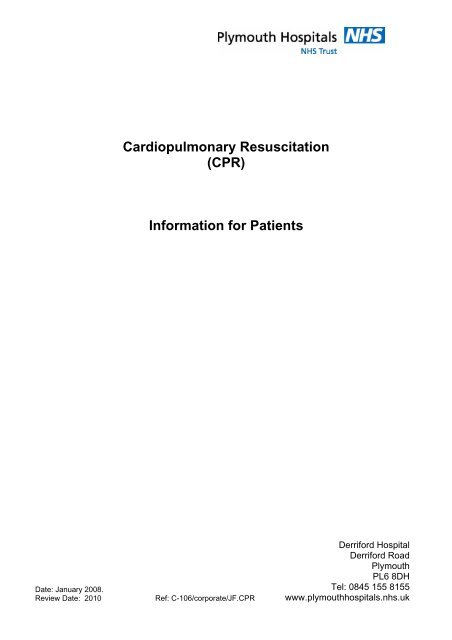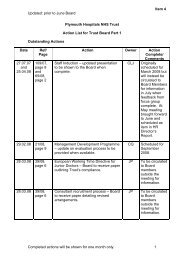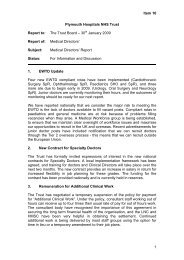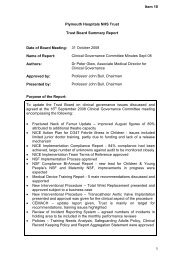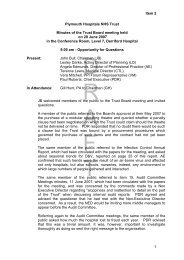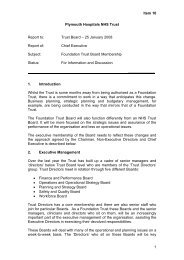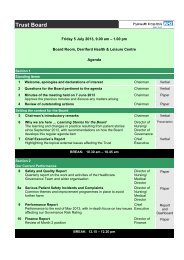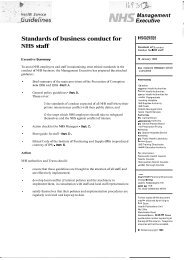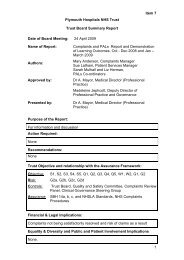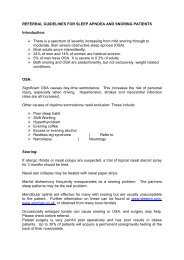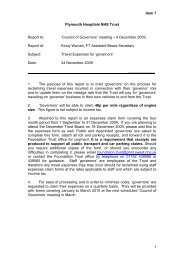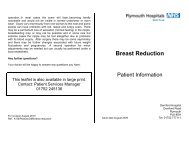Patient Information Leaflet - CPR - Plymouth Hospitals NHS Trust
Patient Information Leaflet - CPR - Plymouth Hospitals NHS Trust
Patient Information Leaflet - CPR - Plymouth Hospitals NHS Trust
You also want an ePaper? Increase the reach of your titles
YUMPU automatically turns print PDFs into web optimized ePapers that Google loves.
Cardiopulmonary Resuscitation<br />
(<strong>CPR</strong>)<br />
<strong>Information</strong> for <strong>Patient</strong>s<br />
Date: January 2008.<br />
Review Date: 2010<br />
Ref: C-106/corporate/JF.<strong>CPR</strong><br />
Derriford Hospital<br />
Derriford Road<br />
<strong>Plymouth</strong><br />
PL6 8DH<br />
Tel: 0845 155 8155<br />
www.plymouthhospitals.nhs.uk
Introduction<br />
To provide the best possible care for you while you are in hospital, we need<br />
to consider every possibility and make sure we know what your wishes are in<br />
the event of an emergency. Please don’t be surprised or alarmed, therefore,<br />
if a doctor talks to you about cardiopulmonary resuscitation, or <strong>CPR</strong> as it is<br />
commonly called. We discuss this because most patients like to have a say<br />
in decisions about their treatment and your views are very important to us.<br />
What is cardiopulmonary resuscitation or <strong>CPR</strong>?<br />
Cardiopulmonary arrest means that a person’s heart and breathing stop.<br />
When this happens, it is sometimes possible to try to restart their heart and<br />
breathing with emergency treatment called <strong>CPR</strong>. <strong>CPR</strong> might include:<br />
repeatedly pushing down very firmly on the chest; using electric shocks to try<br />
to restart the heart; ‘mouth-to-mouth’ breathing; and inflating the lungs<br />
through a mask over the nose and mouth or tube inserted into the windpipe.<br />
Is <strong>CPR</strong> tried on everybody whose heart and breathing stop?<br />
For the vast majority of people, should their heart or breathing stop<br />
unexpectedly, the healthcare team would attempt resuscitation. If people are<br />
already very seriously ill or near the end of their life, there may be no benefit<br />
in trying to revive them should their heart or breathing stop. Indeed some<br />
people may have already expressed a wish not to be resuscitated.<br />
Do people get back to normal after <strong>CPR</strong>?<br />
Everyone is different. A few patients make a full recovery; some recover but<br />
have health problems and, unfortunately, most attempts at <strong>CPR</strong> do not restart<br />
the heart and breathing despite the best efforts of everyone concerned. It<br />
depends on why their heart and breathing stopped working and the patient’s<br />
general health. It also depends on how quickly their heart and breathing can<br />
be restarted.<br />
<strong>Patient</strong>s who are revived are often still very unwell and need more treatment,<br />
usually in a coronary care or intensive care unit. Some patients never get<br />
back the level of physical or mental health they enjoyed before the<br />
cardiopulmonary arrest. Some have brain damage or go into a coma. The<br />
techniques used to restart the heart and breathing sometimes cause side<br />
effects, for example, bruising, fractured ribs and punctured lungs. <strong>Patient</strong>s<br />
with many medical problems are less likely to make a full recovery.<br />
Am I likely to have a cardiopulmonary arrest?<br />
The doctors caring for you are the best people to discuss the likelihood of you<br />
having a cardiopulmonary arrest.<br />
Page 5
What is the chance of <strong>CPR</strong> reviving me if I have a cardiopulmonary<br />
arrest?<br />
The chance of <strong>CPR</strong> reviving you will depend on:<br />
• why your heart and breathing have stopped;<br />
• any illnesses or medical problems you have (or have had in<br />
the past); and<br />
• the overall condition of your health.<br />
Attempted <strong>CPR</strong> is successful in restarting the heart and breathing in about 4<br />
out of 10 patients. On average, 2 out of 10 patients survive long enough to<br />
leave hospital. The figures are much lower for patients with serious underlying<br />
conditions.<br />
Does is matter how old I am or that I have a disability?<br />
No. You age alone does not affect the decision, nor does the fact that you<br />
have a disability. What is important is:<br />
• Your state of health<br />
• Your wishes, and<br />
• The likelihood of the healthcare team being able to achieve<br />
what you want.<br />
Who will decide about <strong>CPR</strong>?<br />
You and your doctor will decide whether <strong>CPR</strong> should be attempted should<br />
you have a cardiopulmonary arrest. The team looking after you will consider<br />
all the medical issues, including whether <strong>CPR</strong> is likely to restart your heart<br />
and breathing if they stop and for how long. It is beneficial to attempt<br />
resuscitation if it might prolong your life in a way that you can enjoy.<br />
Sometimes, however, restarting people’s heart and breathing leaves them<br />
with a severe disability or only prolongs their suffering. Prolonging life in<br />
these circumstances is now always beneficial. Your wishes are very<br />
important in deciding whether resuscitation can benefit you, and the<br />
healthcare team will want to know what you think. If you want, your close<br />
friends and relatives can be involved in discussions.<br />
What if we haven’t decided and I have a cardiopulmonary arrest?<br />
The doctor in charge of your care will make the decision about what is right<br />
for you. Your family and friends are not allowed to decide on your behalf.<br />
However, it can be helpful for the healthcare team to talk to them about your<br />
wishes. If there are people you do (or do not) want to be asked about your<br />
care, please tell the healthcare team.<br />
Page 5
I don’t want anyone to try to resuscitate me. How can I make sure they<br />
don’t?<br />
If you don’t want <strong>CPR</strong>, you can refuse it and the healthcare team must follow<br />
your wishes. You can make a living will to put your wishes in writing. If you<br />
have a living will, make sure that the healthcare team knows about it and put<br />
a copy of it in your records. You should also let people close to you know so<br />
they can tell the healthcare team what you want if they are asked.<br />
If it is decided that <strong>CPR</strong> won’t be attempted, what then?<br />
You will continue to get the best possible care. The doctor in charge of your<br />
care will make sure that you, the healthcare team, and the friends and family<br />
that you want involved in the decision, know and understand the decision -<br />
unless you don’t want to talk about it. There will be a note in your health<br />
records saying ‘do-not-attempt-resuscitation’.<br />
What about other treatment?<br />
A ‘do-not-attempt-resuscitation’ order is about <strong>CPR</strong> only and you will receive<br />
all the other treatment you need.<br />
What if I want <strong>CPR</strong> to be attempted, but my doctor says it won’t work?<br />
Although nobody can insist on having treatment that will not work, no doctor<br />
would refuse your wish for <strong>CPR</strong> if there was any real possibility of it being<br />
successful. If there is doubt whether <strong>CPR</strong> might work for you, the healthcare<br />
team will arrange a second medical opinion if you would like one. If <strong>CPR</strong><br />
might restart your heart and breathing, but is likely to leave you severely ill or<br />
disabled, your opinion about whether these chances are worth taking is very<br />
important. The healthcare team must listen to your opinions and to the<br />
people close to you if you want them involved in the discussion.<br />
What if my situation changes?<br />
The healthcare team will review <strong>CPR</strong> decisions regularly, and if your wishes<br />
or condition change.<br />
What if I change my mind?<br />
You can change your mind at any time, and talk to any of the healthcare team<br />
caring for you.<br />
Can I see what’s written about me?<br />
Yes. The healthcare team will make a note of what you say about <strong>CPR</strong> and of<br />
any decisions that are made. You can ask the healthcare team to show you<br />
Page 5
your records and, if there is anything in them that you do not understand, they<br />
will explain it to you. You also have a legal right to see and have copies of<br />
your records.<br />
Who else can I talk to about this?<br />
If you would like to discuss this in more detail, please tell one of the doctors or<br />
nurses caring for you. If you have any concerns of a spiritual or religious<br />
nature, one of the hospital chaplains can discuss these with you.<br />
This leaflet is also available<br />
in large print.<br />
Contact: <strong>Patient</strong> Services<br />
01752 763031<br />
Page 5


